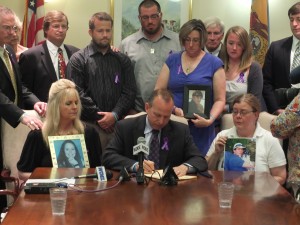DOVER (April 26, 2022) – Delaware will hold its 22nd National DEA Prescription Drug Take-Back Day on Saturday, April 30, 2022. Delawareans can discard their expired or unused medications at locations statewide between 10:00 a.m. and 2:00 p.m. There will also be Sharps disposals for needle disposal at select locations, and overdose response education with free Narcan available at select locations.
Organized nationally by the Drug Enforcement Administration (DEA), Prescription Drug Take-Back Day is operated locally by the Division of Public Health (DPH). The twice-a-year event is aimed at reducing the risk of prescription medications being diverted for misuse and has resulted in nearly 100,000 pounds of medication being collected since 2010. Properly discarding unused medications through this event is an important ongoing activity in the effort to address the nationwide opioid epidemic. Doing so reduces the risk of addiction by keeping prescription medications out of the hands of people who may misuse, abuse, or divert them, and helps reduce the risk of drug overdoses.
“The addiction for far too many people living with substance use first began because they had access to prescription medications from the homes of someone they know,” said DPH Director Dr. Karyl Rattay. “By safely turning in your prescription medications that have expired, or that you no longer need, on Drug Take-Back Day, you can help fight the epidemic in Delaware while also making your home safer.”
According to the 2020 National Survey on Drug Use and Health, 16.1 million people reported misusing any prescription drug in the past 12 months. The survey also showed that a majority of misused prescription drugs were obtained from family and friends, often from the home medicine cabinet. According to the state Division of Forensic Science, there were 515 overdose deaths in 2021 in Delaware, a 15 percent increase from the 447 reported in 2020.
In addition to the sites participating in National Prescription Drug Take-Back Day activities, there are 28 permanent medicine drop-off locations across the state available year-round. Six of Delaware’s permanent drop-off sites are in Walgreens pharmacies and the other 22 are located in local law enforcement agencies. In addition to medicine drop off locations, DPH and community partners also distribute medication deactivation bags to the public to use at home. For a list of permanent collection sites and how to get a free disposal bag, visit www.helpisherede.com/understanding-addiction/safe-drug-storage-and-disposal.
The medications to be disposed of at the Take-Back Day locations must be in a container such as a pill bottle, box, blister pack, or zipped plastic bag, with personal information removed. Liquid medications must be in their original containers. Besides medications, vape pens and e-cigarettes will be collected if the batteries are removed. There are 25 locations participating in the National Prescription Drug Take Back event. You can find the list of locations here: https://www.dea.gov/takebackday.
Delawareans can bring any used needles to be disposed of properly at the following locations (https://www.helpisherede.com/documents/DDPHOHCR-34668-HelpIsHereDE-SharpsDisposalLocations_R1.pdf). The used needle disposal containers are only for public and not commercial entities, and individuals will need to sign a waiver stating that needles are from home use. Outside of health care facilities, an estimated 7.8 billion injections occur a year according to solid waste and recycling organization Waste 360. Once recycled, needles can result in accidental sticks carrying blood-borne pathogens. The safest way to dispose of needles is to use a designated Sharps disposal container which is delivered to incinerators so that accidental exposure cannot occur.
To further enhance overdose prevention and education efforts, three of the DEA National Prescription Drug Take Back locations (Middletown, Wyoming, and Selbyville Police Departments) will also be offering Overdose Response Training and Narcan distribution to the public. It is recommended that anyone who has a prescription opioid or has friends and family who use opioid prescriptions or illicit drugs receive this training and the overdose reversal medication, Narcan. For other community trainings and where you can get free Narcan go to: https://www.helpisherede.com/overdose-prevention.
For more details about the National Prescription Drug Take-Back Day, visit http://dhss.delaware.gov/dph/hsp/hhdrugtakeback.html.
If you or a loved one is struggling with addiction in Delaware, call DHSS’ 24/7 Crisis Hotline to be connected to treatment and recovery options. In New Castle County, call 1-800-652-2929. Or in Kent and Sussex counties, call 1-800-345-6785. For free 24/7 counseling, coaching, and support, as well as links to mental health, addiction, and crisis services call the Delaware Hope Line at 833-9-HOPEDE. To search online for treatment and recovery services in Delaware or nearby states, visit HelpIsHereDE.com.
####
A person who is deaf, hard-of-hearing, deaf-blind or speech-disabled can call the DPH phone number above by using TTY services. Dial 7-1-1 or 800-232-5460 to type your conversation to a relay operator, who reads your conversation to a hearing person at DPH. The relay operator types the hearing person’s spoken words back to the TTY user. To learn more about TTY availability in Delaware, visit http://delawarerelay.com.

